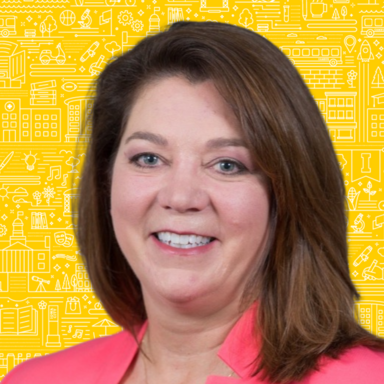
Stephanie Downs, MS, WellBeing and WorkLife Coordinator, University Human Resources, Iowa State University
1. Please describe your role on campus.
I am responsible for ISU Well-Being at Iowa State University. Our programs and services are available to our 6,800 employees. We provide awareness campaigns, flu shot clinics, personal well-being opportunities, and organizational and team development.
2. How do you lead and interface with mental health and well-being on your campus?
I work closely with entities across campus including Human Resources, Student Health and Wellness, Provost’s Office, Environmental Health and Safety, and Live Green. Focusing on the university as a whole, we partner wherever we can. Examples include:
- Working with Facilities for campus biking and walking options
- Partnering with Student Counseling in offering Mental Health First Aid (MHFA) trainings and providing a Therapy Assistance Online (TAO) platform for Faculty and Staff
- Offering employees/departments meditation practices, resiliency training, and burnout presentations
3. Would you share a story where you were concerned about something or someone, and the steps you took that either helped and/or left you considering how you would do it differently?
I had an opportunity to present to a group that provides essential services year-round, sharing about creating fulfilling and engaging work environments. One participant came to me in tears sharing her story, hurt feelings, and frustration. She stated she had several work life challenges and her work environment and co-workers weren’t supportive.
Knowing how much her management team cared, I took the opportunity to speak with them. During that conversation, we shifted from a difficult employee perspective to one of supporting her work life and well-being. Later, I found that her manager engaged in a conversation with her and they found a similar position, different hours, and new location for her in the unit. She was doing well and was able to more effectively manage her work life. She felt welcomed and supported by her team.
It felt good to be a part of the solution by encouraging management to take a caring and curious approach and see employees as needing support and resources and not being difficult. I wonder the difference we could make if we chose to see all employees as whole people wanting to thrive, putting care and support before judgement.
4. Could you tell us about one high point and one low point in your work?
High Point: Without a doubt it is hearing from employees about how programs, services, or resources have made a difference in their lives. One employee shared how one of our programs helped her survive suddenly losing her father. The practice we offered gave her a safe space to process her grief and find community that supported her. Hearing from someone that you helped them through a really tough time, saved their life because you recommended they see their physician, or just stating gratitude for programs and university support, fills me up and energizes me for months!
Low Point: I hit low points in my work when I get stuck. When resources (funding, staffing) are tapped and I can’t implement a new program or support a team that needs assistance. Or, when I have done the same thing for a while and do not see new options. I have learned that if I sit with it awhile a desire to run dissipates and the next best option emerges – it’s refocusing priorities, or letting go, or finding a work around.
5. Is there something which you would like to normalize for others, where they may think they cannot share it?
People are complex. There is no perfect solution. It is up to me to make change but have to remember it is impossible to provide everything for everyone. There are incredible moments and there are heart wrenching challenges. Give yourself grace and trust that others are competent adults on their own journey. Well-being is an amazing career, but it is a tough field, burnout happens to everyone - you are not alone!
3 Self-Care Strategies Stephanie Swears By
- Care for your body! This includes walking outside, eating according to my body’s cues, completing preventive exams, and getting 7 hours of sleep! I’m vigilant about sleep!
- Make ‘me time.’ I prioritize practicing breathing and meditation twice a week, and make sure to clear my schedule during busy times.
- Lean into friendships. I could not care for me if I didn’t have dear and trusting friends to vent to and who are willing to push back gently and objectively. They keep me in check.